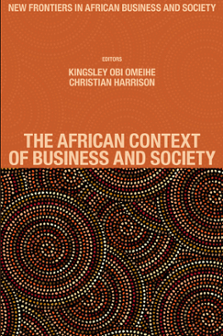
Index
The African Context of Business and Society
ISBN: 978-1-80117-853-2, eISBN: 978-1-80117-852-5
Publication date: 10 October 2022
Citation
(2022), "Index", Omeihe, K.O. and Harrison, C. (Ed.) The African Context of Business and Society (New Frontiers in African Business and Society), Emerald Publishing Limited, Leeds, pp. 215-221. https://doi.org/10.1108/978-1-80117-852-520221011
Publisher
:Emerald Publishing Limited
Copyright © 2022 Kingsley Obi Omeihe and Christian Harrison
INDEX
- Prelims
- Chapter 1: Introduction to the African Context of Business and Society: The way Forward
- Part One: Business
- Chapter 2: Religion a Driver for Employees’ Trust in CEOs
- Chapter 3: Defining Authentic Leadership: A Developing Economy Perspective
- Chapter 4: Managing Service Productivity In Sub-saharan African Banks: The Case of Nigerian Knowledge Workers
- Chapter 5: Crafting Organisational Resilience Through Managerial Performance
- Part Two: Society
- Chapter 6: Cultural Effects on Women’s Entrepreneurial Behaviours in Higher Education Institutions: A Study of The Polygamous Family Firm Context in the Southern Region of Nigeria
- Chapter 7: Corporate Governance Principles and the Challenges of High-power Distance Culture: The Experience of Nigeria’s Employment Terrain
- Chapter 8: Contextualising Sustainability Reporting in Host Communities: An Insight from a Mining Subsidiary in Ghana
- Chapter 9: The Strength of Trust, Social Norms and Entrepreneurship for Trade Networks: Evidence from Nigerian Trader-Owned Enterprises
- Chapter 10: Challenges Faced by Entrepreneurs in Nigeria: A Study of the Retail Pharmacy Sector
- Index